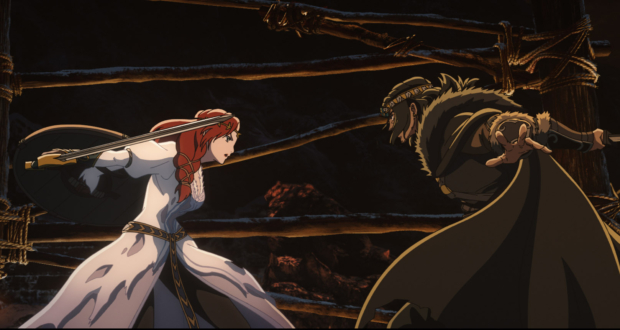If you’ve ever seen a pair of eyeglasses with frames like saucers, a necklace with big enough beads to be used in the World Series, or a feather boa digesting a large rodent, chances are the inspiration for the design came from one woman. Name: Iris Apfel. Profession: interior decorator extraordinaire, thrift store miner, Harlem world shopper, and the godmother of haute couture.
Albert Maysles’ new and final film, Iris, explores all things Apfel. Iris is the focus of Maysles’ lens, gabbing like a grandmother of culture and not of rug rats. At 90 years old, she maintains the energy of a person far younger than me. Maysles, who left us this past March at the age of 88, made films until his last days and here chooses a contemporary to bring into focus for his swan song. When the camera turns around for a second at Albert—quiet and shy, afraid to take away from his subject—we’re left with a lasting image of a great filmmaker. One day Iris will stand as an eternal goodbye to Ms. Apfel, too.
Iris lives an incredibly busy life, taking nonstop phone calls, going to parties and interviews, hawking a line of costume jewelry for the Home Shopping Network, speaking at seminars, meeting her drooling admirers, and, forever and always, hunting for clothes, shoes and jewelry to match with her signature eyewear. Her fashion collection is astounding. She’s got bracelets from Tibet, shaman’s jackets from China, Versace trousers, lush boas, weight-of-the-world necklaces, colorful slip-ons, and countless pairs of glasses. She stuffs it all into various apartments (one in New York, one in Palm Beach, a couple more here and there), the rest in a storage unit big enough to house a cult.
Iris does more than introduce us to one of the fashion world’s greatest secret agents. It also allows us to get inside the mind of a fashion icon, of a great thinker of the age-old question of “what to wear?” Getting to know her is getting to know an art form by way of one of its most devoted students. And being a fashion-o-phile is a hell of a lot ritzier than being a cinephile. There’s a scene where Iris speaks to a woman at a fashion expo and introduces her to the man behind the camera. The woman doesn’t share the same enthusiasm as Iris does in her reverent introduction, not seeming familiar with Mr. Albert Maysles. The greats collide like myths from different cultures, or like a DC-Marvel crossover issue (for those of you who light up to this in the NOW reference). It’s funny to have barely known of Iris Apfel myself, only to be baffled by watching a person on the screen who is unfamiliar with Albert Maysles. The fashion world and the movie world, not for the first time, but in the most literal way, come together here. The screen is a perfect window, as always, into another form of expression, a different way of life.
Maysles paints Iris to be the saintly sister of the church of fashion, in one shot pointing the camera looking up at her, a window in the background allowing godlike light to shine through. Though we see her as an icon, Iris is a person, an older person, and no outfit is going to be perfect to meet your maker in (though you have to believe Iris has left strict instructions for the day). Seeing her husband Carl’s one-hundredth birthday celebration reminds us that these interesting people overflowing with life on the screen are reaching the end of the rope. Making it a century on this earth is a rare feat, though not one Iris is keen to slow down and admire. The fashion advice is never ending. According to Iris, it’s not chic to wear black—it’s conformity. She exposes the weariness of the sage when she laments the lack of individuality permeating the business today. And she spills the secret for what works and what doesn’t—it’s a gut feeling (from the proper gut). She’s cute, funny, smart, all there, and has done a lot both for her industry and for herself. But the universal stuff, the somber moments, comes when Iris removes her bulletproof Chanel vest and allows us in to her personhood. She admits that having children would’ve upset her career, that one can’t really have it all. She also tells us it’s important for her to stay busy. Stopping to smell the roses makes her depressed. Her sacrifices aren’t regarded as regrets, but we know the pain in making choices in life. Walking through a door sometimes means it shuts behind us.
Like in my favorite film of 2014, Steve James’ Life Itself, the documentary about the great Roger Ebert, Iris allows us not simply to know the person, or to savor the icon, but to gain comfort in knowing we are all in this together, that we can’t take any of this with us. Albert Maysles spent his last days acquainting us with Iris, and not with himself, in hopes we will get to know them both better in the long run. Maysles does what great documentarians do, forever curious in others, capturing something from their subjects that somehow says something greater about life than about any one person’s experience.
I Give Iris a 6.5 out of 10




















